By Silah Koech Hiiii…every one there, here are a few tip’s on management and control of Downy mildew before the start of Elnino rainfall. Use
Category: Featured Past Articles
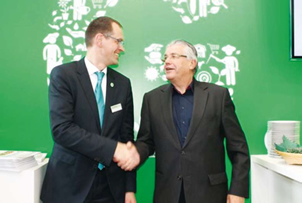 The two certification standards for flowers and plants agree cooperation. MPS and GLOBALG.A.P. have announced their agreement to work together and offer a synchronized certification solution for the horticultural sector.
The two certification standards for flowers and plants agree cooperation. MPS and GLOBALG.A.P. have announced their agreement to work together and offer a synchronized certification solution for the horticultural sector.
The partnership will combine the MPS-ABC system with the GLOBALG.A.P. certification standard. Growers will be offered a onestop solution: two certificates with a single audit, with the additional benefit of having access to the MPS-GAP Brand when these assessments are also combined with GRASP.
“Our aim is to offer a single point of entry for growers and their retail customers to demonstrate their progress towards sustainability”, said Theo de Groot, Director of MPS, “because we recognize the trend toward asking for more data and transparency in combination with good practice certification in the coming years.”
“We need to reduce complexity and eliminate duplication, thus offering a more cost-efficient solution for those producers who need to demonstrate compliance with both standards,” added Dr. Kristian Moeller, CEO of GLOBALG.A.P. “At the same time we have to take into account the growers’ legitimate data privacy requirements in our efforts to develop transparent, validated and integrated solutions.”
Competition has been the engine behind business and supply chains since the two sprung into existence. Even back when the first people swapped goods and bartered for services – and when the term ‘supply chain’ was millennia away from being coined – competition was a driving force.
With competition playing such a critical role in the business realm, one might underestimate the smaller players. How can a multinational flower grower compete with small scale? How can the small or midsized retailer go toe-to-toe with the auction?
True, the smaller players are sometimes struggling to emerge from their larger competitors’ shadows. Indeed, titans have proved ruthless adversaries.
But that doesn’t mean SMEs aren’t a force to be reckoned – or partnered – with. While they may not have the deep pockets or namerecognition of the big guys, they possess their own proficiencies: like the ability to adapt quickly, to be nimble, and to change at a moment’s notice. They are also hungry for growth and, unable to afford customer attrition, intensely loyal.
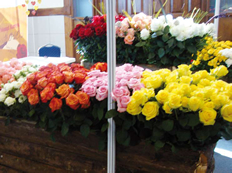 Cold chain management in cut flower supply chains is now of major importance due to markets which are far apart. A research carried showed possible ways to realise the added value of investing in cut flower cold supply chains.
Cold chain management in cut flower supply chains is now of major importance due to markets which are far apart. A research carried showed possible ways to realise the added value of investing in cut flower cold supply chains.
It suggests that in addition to the external quality parameters currently being used in the grading system at flower auctions, internal quality attributes such as vase life should be considered. It is assumed that considering internal quality attributes such as vase life will result in the realisation of the value of investing in cold chain management. Flowers from a well-managed cold chain are likely to have a longer vase life and also likely to attract higher prices. The use of predictive modelling to predict vase life and three predictive models that have been put forward in literature are discussed.
Temperature also has an effect on the rate of metabolism, water loss, tissue deterioration and growth of Botrytis cinerea in harvested cut flowers. Although the development of B. cinerea is mainly influenced by the presence of condensed water on the flower as it allows spores to germinate, temperature also play a role in the germination of the spores.
The presence of B. cinerea and other physiological defects seem to have great repercussions in the cut flower supply chain. A few or minor defects on the flowers can render them undesirable on the market for aesthetic reasons.
The strength of family business and its importance to an economy is widely praised. The family business is a success. But what about the ‘behind the scenes’ of all these success stories? What is ‘the real story’? Because where people work, there are strong emotions.
It seems that within the family, the emotional factor plays an even greater role than in a non-family business. Emotions can be a source of strength, but also a source of conflict. Why is one family business able to handle these emotions, whereas another family business becomes a victim of their emotions? In short: what is the psychology behind the family business?
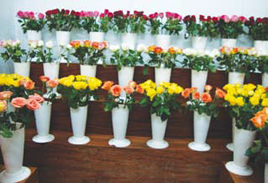 Cold chain logistics requires maintaining temperature integrity, controlling all the processes involved means high levels of integration and coordination. Each supply chain partner— from harvester or producer to the ultimate seller—shares responsibility. For example, cold chain transportation units are commonly designed to keep ambient temperature constant, but not to bring a shipment to the optimal temperature. But if a shipment is not adequately prepared and conditioned, its quality may be compromised.
Cold chain logistics requires maintaining temperature integrity, controlling all the processes involved means high levels of integration and coordination. Each supply chain partner— from harvester or producer to the ultimate seller—shares responsibility. For example, cold chain transportation units are commonly designed to keep ambient temperature constant, but not to bring a shipment to the optimal temperature. But if a shipment is not adequately prepared and conditioned, its quality may be compromised.
Further, if a shipment will be exposed to extreme cold or heat along the transport route, considerations should be made to protect the products in transit. Transportation that extends over multiple days provides a host of opportunities for breaking the cold chain.
Route selection is important in order to maximize cold chain performance, especially in winter and summer. In extreme temperatures, companies should select routes that minimize the number of times doors must be opened. A lot of monitoring and management goes into handling cold chain shipments. Knowing about extreme weather conditions in advance helps optimize equipment use and better protect products.
De Ruiter receives Royal approval
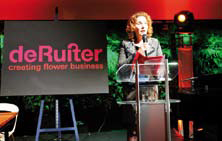 On Wednesday evening November 4, during an evening party at Claus Hoofddorp, rose breeder De Ruiter presented a special highlight of their journey from the past to their present existence. Through a video presentation that featured special effects, older pictures combined with new images, music and catering, guests were led through one hundred years of De Ruiter experiences. The highlight of the evening was presentation of the Royal designation by Mayor Drs. MM van ‘t Veld to De Ruiter directors and owners Henk de Groot and Oscar Peters. From this moment Royal De Ruiter take the opportunity to present its new corporate identity. The new royal blue, which was presented with logo, banners and images, was received with great applause.
On Wednesday evening November 4, during an evening party at Claus Hoofddorp, rose breeder De Ruiter presented a special highlight of their journey from the past to their present existence. Through a video presentation that featured special effects, older pictures combined with new images, music and catering, guests were led through one hundred years of De Ruiter experiences. The highlight of the evening was presentation of the Royal designation by Mayor Drs. MM van ‘t Veld to De Ruiter directors and owners Henk de Groot and Oscar Peters. From this moment Royal De Ruiter take the opportunity to present its new corporate identity. The new royal blue, which was presented with logo, banners and images, was received with great applause.
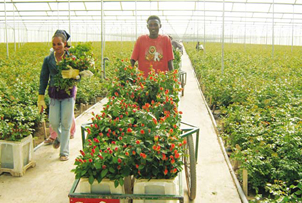 The Ethiopian flower industry is flourishing, with the help of government incentives and low labor costs.
The Ethiopian flower industry is flourishing, with the help of government incentives and low labor costs.
The country is now the second-largest flower exporter in Africa, with over 100 flower growers on 1,700 hectares (17, 000, 000 square meters or 182,986,477 square feet).
“We are now second in Africa only to Kenya, and we expect to overtake them soon,” Berhanu Ludamo, Promotion and Information Service Head of Ethiopian Horticulture Producers Exporters Association said.
“Ethiopia earned $250 million from horticulture export in 2014. The amount is expected to increase this year due to the expansion of horticulture farms.” Berhanu said. The area will grow to 3,000 hectares Fontana Flowers will begin operation of its horticulture farm in Ethiopia at the cost of 11 million dollars.
The company has leased a 100 ha land at Wenjeta and Wegelta kebeles 20 Km from Bahir Dar in the Amhara Regional State. Currently Fontana, which has hired 1,300 employees, is clearing land for growing roses and for warehouse construction. The company will exclusively grow different cut rose varieties. It will first start growing on 65 ha, with a target revenue of 95.9 million US$ a year.
Features International Joint Booths
A total of 20 countries have organised one or even several community booths at the IPM ESSEN – in all areas. Guatemala is a new participant exhibiting cut flowers, potted plants and perennials. China, France, the United Kingdom, India and Taiwan have expanded their booths. And there are additional national booths from Belgium, Costa Rica, Denmark, the Netherlands, Israel, Italy, Portugal, Poland, Spain, Sri Lanka, South Korea, Turkey, Hungary and the United States.
Belgium
Around 40 Flemish companies are participating in the Belgian joint exhibition, which includes three stands again in Halls 2 and 12. In Hall 2, the focus is on ornamental plants, laurels, azaleas, rhododendrons and young plants. In addition, there are local businesses specialising in young house plants, chrysanthemums, garden plants and perennials. The six companies in Hall 12 are displaying trees, woodland and hedge plants, roses and ornamental bushes. Flemish exhibitors have been well represented at the trade fair with a joint booth since the first IPM ESSEN. (Hall 2, booth 2B25 and 2D30; Hall 12, booth 12C15)
Effective CCM begins on the farm and ends once the product reaches the customer. Therefore, a cold chain is definitely a strategic competitive advantage in
